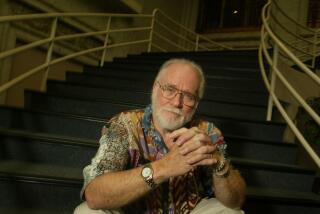Alexander Haagen dies at 91; developer who served on Los Angeles Coliseum commission
Alexander Haagen, a major Southern California shopping center developer who, as president of the Los Angeles Memorial Coliseum Commission in the late 1980s, clashed with Los Angeles Raiders owner Al Davis over proposed stadium seating renovations before Davis announced plans to move the pro football team to suburban Irwindale, has died. He was 91.
A longtime resident of Palos Verdes Estates, Haagen died of age-related causes April 26 at an assisted-living center in Beverly Hills, said his son Alexander Haagen III.
Haagen began his real estate career in Los Angeles in the late 1940s with his wife, Charlotte, and founded Alexander Haagen Properties in 1963. The Manhattan Beach-based firm went on to become one of the largest retail development companies in Southern California.
By the time Haagen stepped down as chairman and chief executive when his publicly traded company was taken over by Lazard Freres & Co. in 1997, it had acquired, developed and redeveloped nearly 120 shopping centers, including Media City Center in Burbank, Manhattan Village in Manhattan Beach, Palm Court in Fontana and Baldwin Hills Crenshaw Plaza.
Haagen, a major political contributor in Los Angeles, was well known for his redevelopment shopping center projects in underserved urban areas.
The first one, the Vermont-Slauson Shopping Center, opened in 1981.
“Sears had closed and left in the middle of the night,” Alexander Haagen III recalled this week. “There was a huge uproar [in the community] that they had left: They lost their shopping and a lot of jobs in a very poor area that really had a lot of unemployment. Mayor Tom Bradley called my dad and asked him if he would build a new shopping center where Sears had left.”
The urban shopping centers, the younger Haagen said, “were actually less profitable than doing projects in affluent areas, and you had to give the tenants really good deals to get them in because they were afraid. It was a real challenge.”
But, he said, his father believed it was important to help provide better shopping opportunities “and develop employment in these underserved areas. He really believed that.”
In 1983, Haagen took over as the developer of an unfinished shopping center at 103rd Street and Compton Boulevard in Watts, the first shopping center to be built in the area since it had been ravaged by fire during the 1965 riots.
The Martin Luther King Jr. Shopping Center opened on the site a year later, a symbol, one resident said at the time, “that Watts is on its way back.”
In 1985, Haagen was appointed to the Coliseum Commission.
As commission president in 1987, his public feud with Davis began in February when the Raiders stopped construction of their planned luxury suites on the Coliseum rim, charging that the commission was defaulting on a pledge to proceed with $9 million in stadium seating changes at the same time.
Haagen, according to a Times story, took the position that it had not been proved that any renovation pledge had been made.
That August, Davis announced plans to move the Raiders to Irwindale.
Although the commission adopted a resolution that fall expressing its intent to take on a seating change project that year, which would put spectators closer to the field, Haagen maintained that there was neither adequate money nor time to do the project that year.
In December, Haagen said he would be leaving the nine-member commission when his term as president expired the next February. He was, he told The Times, tired of appearing to wear “the black hat” in the Coliseum-Irwindale controversy.
“I don’t think at this point, being accused of being the culprit who has helped create the situation between the Raiders and myself, that I can be effective,” he said.
“It’s no secret Alexander Haagen and Al Davis were like oil and water,” future Los Angeles Mayor Richard Riordan, who took over as the commission’s new president, said in 1989 after Haagen and his ally, Fred Reidman, were replaced on the commission.
Davis reportedly had refused to negotiate with the commission as long as Haagen and Reidman remained on the board.
The Raiders’ Irwindale deal later fell through, and the team returned to Oakland in 1995.
After selling Alexander Haagen Properties, Haagen started a new firm called Haagen Co., run by his son Alexander, which continues to develop shopping centers. Haagen stayed on as chairman of the board until his death.
The only child of a show business entrepreneur and theater owner, Haagen was born June 1, 1919, in Denver and moved to Los Angeles as a young boy.
A Los Angeles High School graduate, he took pre-law classes at L.A. City College and lived briefly in New York before returning west and working as a welder in a shipyard.
After serving in the merchant marine as a cook and baker on tankers in the Persian Gulf during World War II, Haagen bought a jukebox route that covered waterfront bars in San Pedro. He sold the business for a profit after a couple of years, and he and his wife went into real estate.
After initially brokering and selling small businesses, Haagen launched the National Buyer’s Guide, a major national real estate publication, and later began buying corner lots along arterial roads to resell to oil companies for service station sites.
Charlotte Haagen died in 2000.
In addition to his son Alexander, Haagen is survived by son Charals, five grandchildren and three great-grandchildren.
More to Read
Start your day right
Sign up for Essential California for the L.A. Times biggest news, features and recommendations in your inbox six days a week.
You may occasionally receive promotional content from the Los Angeles Times.




















































